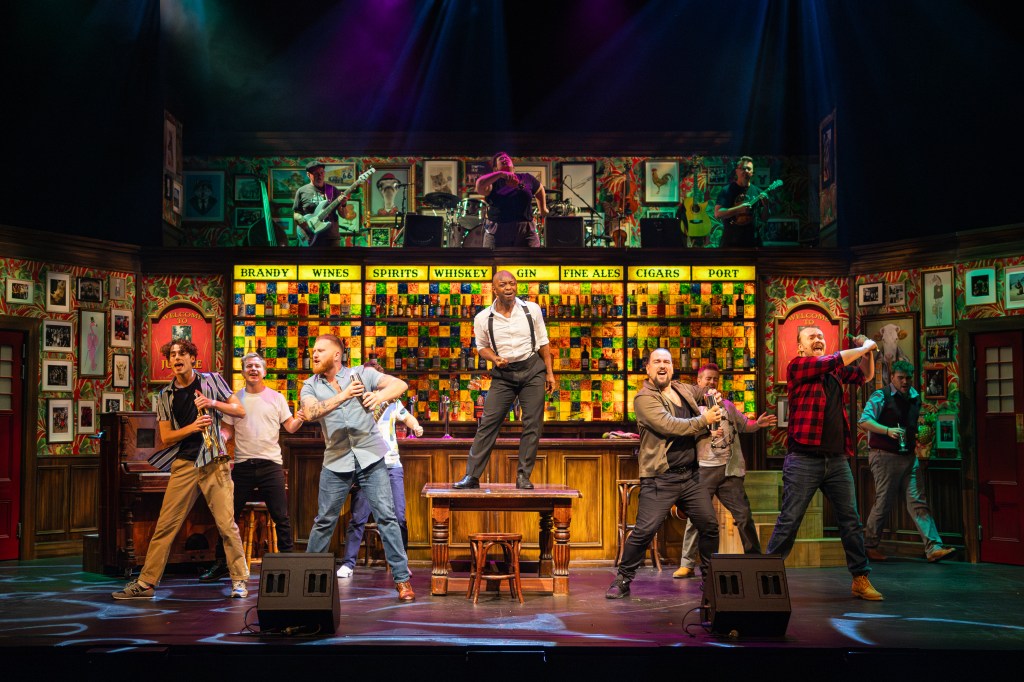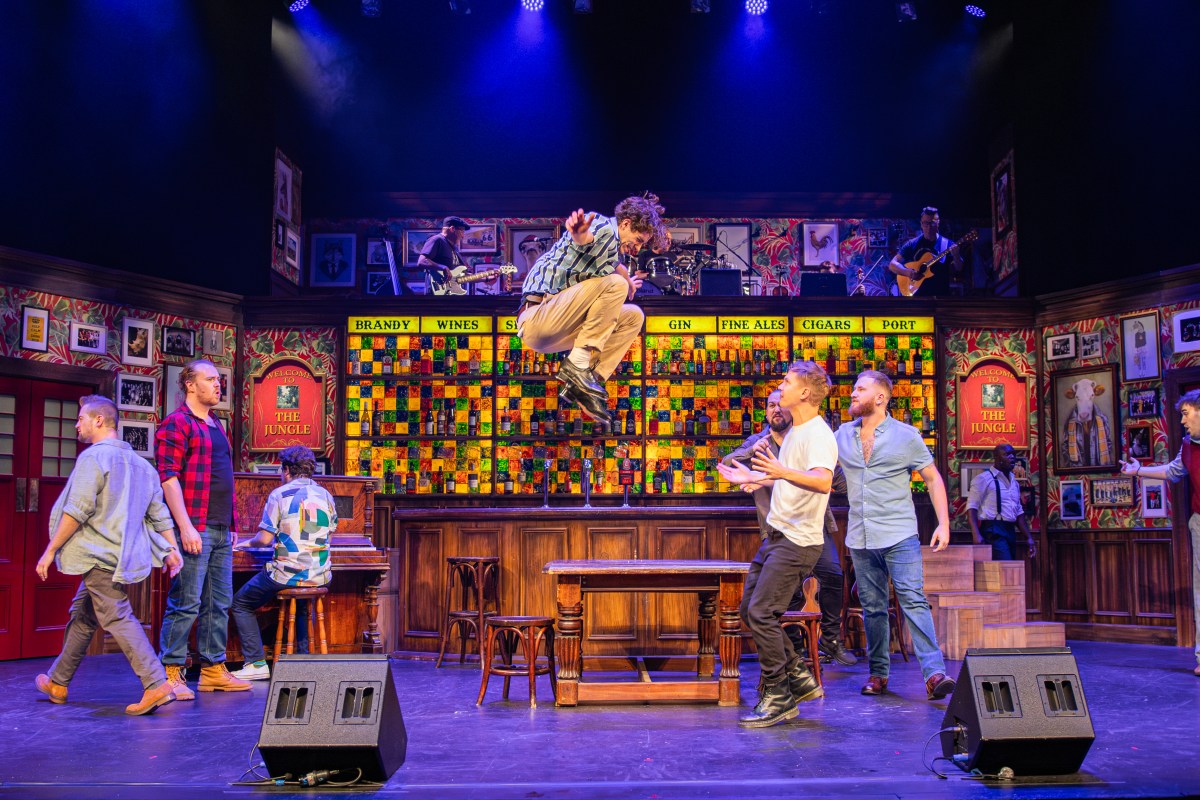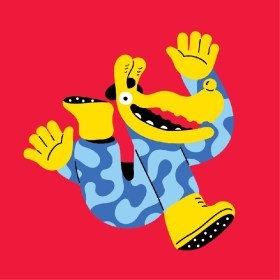Going into see the Oliver-Award nominated The Choir of Man at Melbourne’s Playhouse theatre, I had two contrasting recent experiences running through my head: one about choirs, and the other men and pubs.
As part of my day job, I’d recently published a feature about the benefits of singing in choirs. I’d interviewed music psychologists, long-time professional choir directors and choralists and discovered that it’s not only clearly enormously enjoyable for those who sing in choirs, but there is a growing body of research to show that it is really good for us.
There is a push to prescribe singing in clinical settings, for all sorts of health benefits, from curing loneliness to aiding patients with dementia, and the worldwide Pub Choir phenomenon, which Brisbanite Astrid Jorgensen began in 2017, has shown us that pubs and singing go together like beer and bubbles.
Interestingly, what I learned from those interviews was that (at least in Australia and many Western countries), men (largely) don’t sing in choirs. Yet here I was, at Melbourne’s Playhouse Theatre, seeing a show that seemed (at least by its title) destined to prove me wrong.
The show has come directly from a season in London’s West End where it was nominated for Best Entertainment of Comedy Play in the 2022 Olivier Awards. This Melbourne production has an all-new cast and is the first international touring location before the show then travels to Chicago in March.
The Playhouse in the Arts Centre, with its large proscenium arch, upper circle and no centre aisle, seems an unlikely choice for a jukebox-style musical theatre show that strongly encourages audience participation. We were told by the usher on our way in that if we wanted a drink, we could head up to the stage to get a free one at the bar. And certainly – with eight minutes to the show opening – hundreds of people were making their way up to the stage (sometimes having to climb over 20+ other patrons to get there, due to the width of the theatre and the lack of centre aisle).
The wide stage had been transformed into an old-school British pub: dark timber bar, red saloon doors, dark timber bar stools and plenty of beer on tap. The welcoming invitation to the audience set the tone for the show, which from go to woah was full to the frothy brim with sheer joy.
As the cast wound their way through the busy pub prior to the show opening, they shared a drink and a laugh with the audience members on stage, who eventually cleared, before one of the cast introduced himself as The Poet (performed by Alistair Higgins the night I saw it), to commence the show. The Poet welcomes us to this, our local pub for the night, and introduces the other men in the cast by their nicknames – each name signifying the place each one held in this community of choralist pub-goers (Maestro, Hardman, Beast, Joker, Bore, Barman). The poet also introduces the four-piece band (drums, bass, guitar and violin) who are placed on a mezzanine level of the stage overlooking the pub.
The second thing that was running through my head throughout seeing The Choir of Man, was having seen the Australian film The Royal Hotel the night before. Co-written and directed by Kitty Green, this film is set in a pub in a remote outback mining town, frequented by heavy-drinking male FIFO workers whose characters range on a spectrum of casually sexist to downright dangerous.
Set in a pub, with a largely male pub-going cast, I couldn’t help drawing the comparison – despite being the antithesis of what The Choir of Man is about. Both deal in male culture, drinking culture and the importance of the pub as a gathering place. But that’s where the comparison stops.

While The Royal Hotel is focused on male sexual violence and toxic elements of that culture, The Choir of Man is like a balm for the soul – the young men share their stories, music and dance with us through slickly choreographed, multi-part choral arrangements to well-known songs, including an (astonishingly good) a cappella version of Sia’s ‘Chandelier’, a brilliantly choreographed version of Adele’s ‘Hello’ by a spotlit Hardman (Will Silver), while the rest of the cast mime watching a sporting match, and a version of John Farnham’s ‘You’re the Voice’, which morphs into a whole-of-theatre singalong with the audience beaming.
The choreography and deft handling of the numerous audience participation sequences help to move the action of the show, while ensuring the audience members on stage feel comfortable. Cast members bring the audience members drinks then sit them down in chairs. One cast member, the Bore (performed by Aled Pennock the night I saw it) gave an audience member invited to the stage a pack of cards to share in an activity building a house of cards; Beast (Rob Godfrey) serenaded another audience member to Katy Perry’s ‘Teenage Dream’ – to much laughter.
Many of the cast are highly proficient instrumentalists and dancers, and these skills are capitalised on in the show, with Handyman (Ethan Vijn) performing an incredible solo tap-dancing sequence, before blowing a few notes on a trumpet, and later jumping on the piano. Others have guitars, there is a banjo, a piano accordion, and a melodica also makes an appearance at one point. The stage/pub piano gets a workout with a number of impressive virtuosic piano performances from different cast members (particularly Matthew Campbell, as Maestro).
There is a strong sense that the show emerged from post-COVID lockdowns. The Poet mentions a few times throughout the show how important pubs are, especially now, after having lost that gathering place for so long. The sense of community the pub, and its choir, fosters between these men is a prevalent theme – how the group members each help the others out when things get tough: through break-ups and loss, in good times and bad.
This is an affable group of men – warm and funny and welcoming – and their ability to make everyone in the audience feel part of their motley crew, while never derailing the action, is a brilliant feat of all the elements of the production working together. And those gorgeous multi-part harmonies? It’s impossible not to feel the soaring rush of joy, effervescing like the bubbles in a freshly poured pint.
In stark contrast to what we hear (and see, and experience) about some of the darker elements of male culture – toxic masculinity and the connection drinking has in exacerbating male violence, as depicted in The Royal Hotel – The Choir of Man is the sunny side of the street.
Read: Exhibition review: John Nixon – Four Decades, Five Hundred Prints, Geelong Gallery
And, given what we are increasingly coming to understand about the host of mental and physical health benefits of singing – and especially singing in choirs being good for community bonding – perhaps the lesson of A Choir of Man is that singing is, in fact, the antidote – the cleansing ale for all that ails us. For men and women both.
The Choir of Man
Arts Centre Melbourne
Creators: Nic Doodson and Andrew Kay
Musical Supervisor, Vocal arranger and orchestrator: Jack Blume
Movement director and choreographer: Freddie Huddleston
Monologues writer: Ben Norris
Scenic designer: Oli Townsend
Associate musical supervisor: Hollie Cassar
Costume designer and associate scenic designer: Verity Sadler
Lighting designer: Richard Dinnen
Sound designer: Sten Severson
Associate director: Tom Brandon
Resident musical director: Alistair Higgins
Associate sound designer: Liam McDermott
Band leader: Craig Newman
Band: Angus Burchall (drums), Marcus Kurban (Guitar), Kyla Matsuura-Miller (Violin), Craig Neman (Bass)
Cast performing the night I saw it: Matthew Campbell, Rob Godfrey, Bradley Walwyn, Alistair Higgins, Aled Pennock, Will Silver, Christan Tyler-Wood, Ethan Vijn, Nathaniel Morrison
Additional cast (not performing the night I saw it): Jordan Donnelly, Connor Going, Norton James
The Choir of Man will be performed until 11 February. This reviewer saw the preview performance on 4 January.





